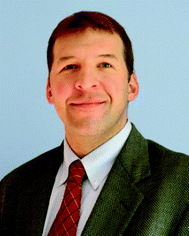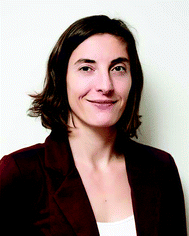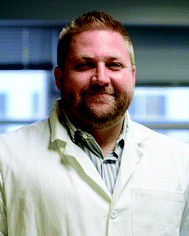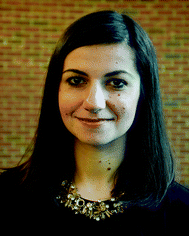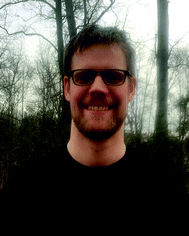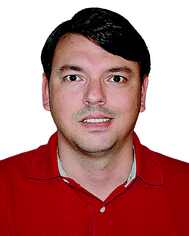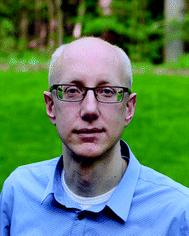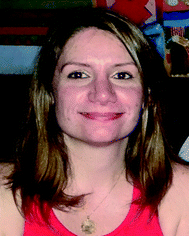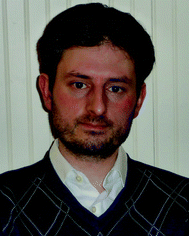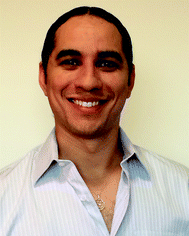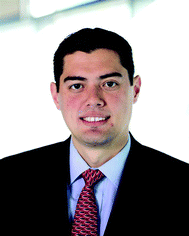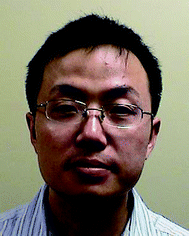Contributors to ‘New Talent: Americas’
This Profile article offers a short introduction to the researchers who have contributed to this themed issue on the talent emerging from the Americas and the excellent work that is being done by them. We would like to congratulate them and their teams on their achievements to date and hope they have continued success in the future as they continue their careers within the medicinal chemistry field.
Kyle was born in 1977 and raised in western Massachusetts. He received a BS degree in chemistry at Messiah College in 2000. He earned a PhD in synthetic organic chemistry at The Pennsylvania State University in State College, PA, with Professor Ken Feldman in 2006. Kyle then completed a two year post-doctoral appointment in the laboratories of Professor Phil Baran at The Scripps Research Institute in La Jolla, CA. In 2008, he was hired as a medicinal chemist in virology chemistry at Bristol-Myers Squibb in Wallingford, CT. Kyle has spent the last eight years working in the area of infectious disease, more specifically, designing inhibitors of both HCV and HIV.
Kim Huard was born in Canada, in 1979. She graduated from the Université de Montréal with a PhD in organic chemistry in 2008 and spent two years as a postdoctoral fellow at the University of California, Irvine. Kim joined Pfizer in 2010 as a medicinal chemist. Since 2012, she has been leading teams on various drug discovery programs in the cardiovascular and metabolic disease research unit located in Cambridge, Massachusetts. Her work involves modulating different types of biological targets with small molecules as well as targeting specific compound disposition such as liver selective or brain penetrant agents. In her current role at Pfizer, Kim works at establishing collaborations to identify new exploratory projects and developing them into clinical candidates.
Robert W. Huigens III was born in the United States of America, in 1979. He received his PhD in Chemistry from North Carolina State University under the guidance of Professor Christian Melander in 2009. Rob then became an American Cancer Society Postdoctoral Fellow at the University of Illinois at Urbana-Champaign where he worked in Professor Paul Hergenrother's lab. In 2013, Rob began his independent career at the University of Florida as an assistant professor of medicinal chemistry. Since that time, Rob has been the recipient of Young Investigator Awards from the American Chemical Society (Division of Medicinal Chemistry) and the Center for Biofilm Engineering (Montana State University) for his group's work on developing bacterial biofilm-eradicating agents against human pathogenic bacteria. Beyond his group's efforts in the antibacterial arena, the Huigens lab is developing a unique ring distortion strategy to rapidly generate complex and diverse small molecules from indole alkaloids. This work aims to drive the discovery of new biologically active small molecules for drug discovery and chemical biology. In addition to his research program, Rob was recently awarded the 2016–2017 College of Pharmacy Teacher of the Year at the University of Florida.
David Marcoux was born in the province of Quebec in Canada, in 1983. He received his BSc in Chemistry in 2005 before earning his PhD in organic chemistry from the Université de Montréal in 2009. There, he worked under the guidance of Prof. Andre B. Charette on the stereoselective formation of cyclopropanes. After a postdoctoral stay at Harvard University in the group of Prof. David A. Evans, David joined Bristol-Myers Squibb in Princeton, NJ, where he is currently a Senior Research Investigator. His current research interests are synthetic organic chemistry as well as medicinal chemistry in the area of immunology and immuno-oncology.
Jasmina Marjanovic was born in Croatia, in 1979. She received her PhD in Organic Chemistry from The University of Chicago in 2010, following which she completed her postdoctoral training in Chemical Biology in David Liu's group at Harvard working on supercharged proteins for drug delivery. In 2012 she joined AbbVie as a Senior Scientist where she is currently part of the Chemical Biology research group. Her current research interests lie in use of bioorthogonal techniques for target engagement and identification.
Ryan Moslin received his BSc in Chemistry from the University of British Columbia (UBC) in 2001, and his PhD in Organic Chemistry from the Massachusetts Institute of Technology (MIT) in 2006. He completed his postdoctoral research, also at MIT, in applied chemical synthesis in 2010. Since 2010 he has worked at Bristol-Myers Squibb (BMS) as a researcher in drug discovery. His current research interests lie in the allosteric modulation of kinases, the identification of new protein targets within the immune system for application to immuno-oncology and autoimmune disease, as well as the design and synthesis of novel drug molecules.
Julio C. Pastre was born in Brazil in 1979. He obtained his PhD in 2009 under the guidance of Professor Carlos Roque D. Correia at the State University of Campinas – UNICAMP. This was followed by a brief one-year spell working as a process chemist at Rhodia. He then spent three years as a postdoctoral researcher at UNICAMP with Professor Ronaldo A. Pilli and joined the group of Professor Steven V. Ley at the University of Cambridge as a Postdoctoral Research Associate. Since 2014, he is working as an Assistant Professor at UNICAMP, and his general areas of interest focuses on the development of new synthetic methods in batch and continuous flow conditions for the synthesis of natural products, new materials, drugs and new drug candidates.
Martin Pettersson was born in Karlstad, Sweden in 1974. He received his PhD in organic chemistry from the University of Texas at Austin in 2007 under the direction of Professor Stephen F. Martin. He then joined Pfizer Worldwide Research and Development as a Senior Scientist, and he is currently an Associate Research Fellow in the Neuroscience and Pain Medicinal Chemistry group in Cambridge, MA. At Pfizer he has made significant contributions as a chemistry team leader for programs such as Gamma Secretase Modulators for Alzheimer's disease that is now in clinical development. His current research interests include medicinal chemistry targeting neurodegenerative diseases, property-based design strategies, and phenotypic drug discovery.
Amedea B. Seabra holds a diploma degree in Chemistry from the University of São Paulo (USP). She finished her PhD at Chemistry Institute, State University of Campinas (UNICAMP) in 2006. Thereafter, she worked as a Research Fellow at UNICAMP (2006–2008), and she took postdoctoral studies at the Chemistry and Biochemistry Department, Concordia University in Montreal, Canada (2008–2010). She is a professor at Universidade Federal do ABC (UFABC). Her present research is focused on the preparation, characterization and evaluation of the cytotoxicity of nitric oxide-releasing polymeric and metallic nanomaterials for biomedical and agricultural applications.
Mohammad R. Seyedsayamdost was born in Iran and grew up in Germany before entering Brandeis University for his undergraduate studies. He obtained a PhD in Chemistry from the Massachusetts Institute of Technology and subsequently conducted postdoctoral studies at Harvard Medical School. In 2013, he joined Princeton University, where he is currently assistant professor of chemistry and molecular biology with additional appointments in the Princeton Environmental Institute and the Woodrow Wilson School. His research group combines tools from several disciplines to interrogate the chemistry and biology underlying microbial secondary metabolites. These include implementation of new discovery methods as well as functional and biosynthetic investigations on secondary metabolites, with a focus on the mechanisms of metalloenzymes that catalyze difficult transformations.
Eufrânio N. da Silva Júnior was born in Brazil in 1982. He received his degree in Chemistry from the Catholic University of Brasília (UCB). In 2007, he completed his MSc at the Fluminense Federal University (UFF) in Organic Chemistry, and in 2009, he concluded his PhD in Chemistry at the University of Brasilia (UnB), Brazil. In 2010, he became Professor of Organic Chemistry at the Federal University of Minas Gerais (UFMG). His current research interests are: C–H activation reactions, asymmetric organocatalysis, mechanistic investigations, and the synthesis of heterocyclic and naphthoquinoidal bioactive compounds. He is also interested in obtaining fluorescent substances for the study of their pharmacological and DNA-binding properties.
Brian was born in Florida, USA in 1985. He earned his BS in Chemistry at the Massachusetts Institute of Technology (USA) in 2008 prior to receiving his PhD in Chemistry from Harvard University (USA) in 2013 under the direction of Prof. Matthew Shair, where he accomplished an enantioselective total synthesis of the anti-depressant hyperforin amenable to analog synthesis. Since then, he has been a member of the Department of Medicinal Chemistry at Amgen in Cambridge, MA, USA, where his work has focused on the advancement of neuroscience programs. Beginning in 2015, he has led Amgen's Med Chem Green Chemistry Team and is a member of the American Chemical Society Green Chemistry Institute Medicinal Chemistry Roundtable.
Hua Xu was born in China in 1981. He received his PhD in Chemistry from Stony Brook University in the United States in 2009. After conducting his post-doctoral research at Albert Einstein College of Medicine, he joined Pfizer as a chemical biologist in 2013, and has been promoted to principal scientist since 2016. He received ACS Young Investigator Award in 2016. His current research interests are using chemical tools and technologies to investigate mode of action of drugs and understand drug occupancy in physiologically relevant systems.
| This journal is © The Royal Society of Chemistry 2017 |

